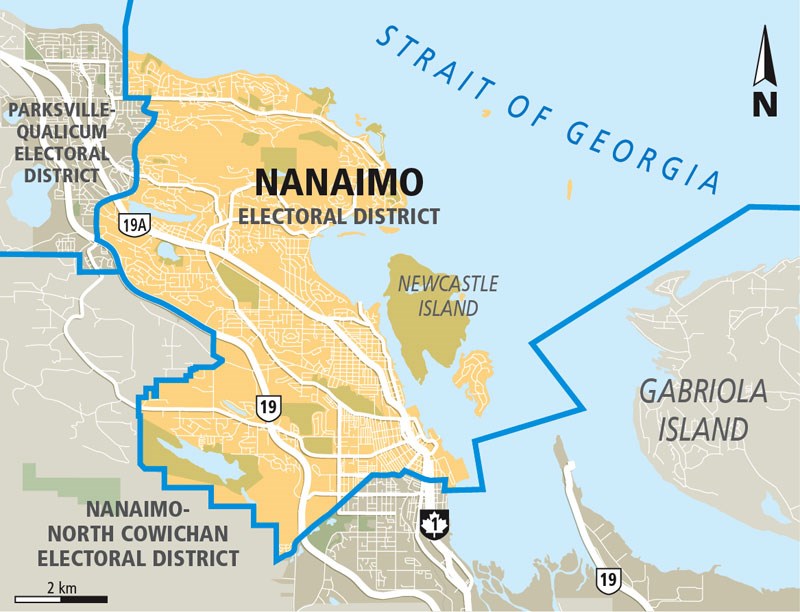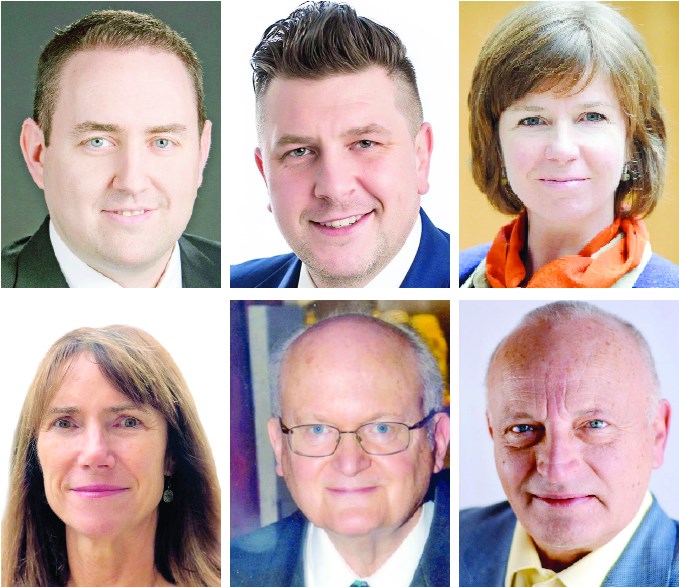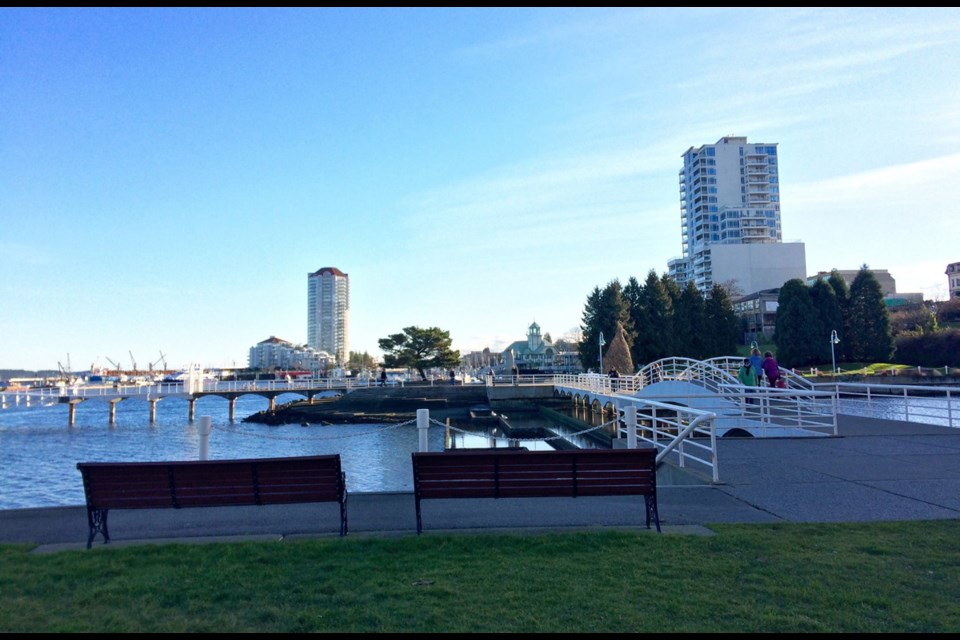NANAIMO — Nanaimo candidates are fighting to hold on to every supporter and win new backers ahead of Wednesday’s byelection — which no one is taking for granted.
Because the Wednesday election has the potential to change the government, Nanaimo is in a position to draw attention to local issues.
The race has drawn six contenders who are battling for the empty seat in the B.C. legislature. Running are Conservative Justin Greenwood, Liberal Tony Harris, New Democrat Sheila Malcolmson, Green candidate Michele Ney, Robin Richardson with the Vancouver Island Party, and Libertarian Bill Walker.
An informal survey of Nanaimo residents this past week revealed a well-informed electorate concerned with matters such as how to foster economic development, add to the affordable housing stock, and improve transportation in the spread-out community. They are well aware of the provincial implications of the election.
“Nanaimo feels sometimes like it doesn’t get what it deserves,” said city resident Robert Wilson, who is retired from the banking sector.
Wilson is backing Harris, saying he performed well when debating opponents. Like the Liberal businessman, Wilson does not approve of the impending speculation tax. Wilson also praised the late Tom Harris, Tony’s father and a prominent businessman and philanthropist, for his involvement in the community.
John Layer, who spent 40 years as a letter carrier, enjoys coffee with his friend Wilson, but doesn’t share his political views, although they agree that the outcome will be close.
Layer voted in advance polls for the NDP’s Malcolmson, pointing to the Insurance Corp. of B.C.’s financial difficulties and Health Ministry researchers who were wrongly fired when the Liberals were in power.
> For more on the byelection, go to timescolonist.com/bcelection
Candidates’ waking moments are tightly choreographed in the countdown to voting day. Every five minutes matters as strategists co-ordinate packed schedules to reach as many voters as possible. Candidates are awake early, planning with their campaign teams, doing media interviews, meeting with groups and individuals, posting on social media, and door-knocking.
“All main parties working hard on this very crucial byelection,” said Michael Prince, the University of Victoria Lansdowne professor of social policy. “[The] NDP are not taking it for granted.”
Nanaimo has been an NDP stronghold for decades, only occasionally being held by another party. The byelection was called after longtime NDP MLA Leonard Krog was elected mayor of Nanaimo and resigned.
At the legislature, the NDP-Green partnership has 44 seats and the Liberals hold 42. If the Liberals win in Nanaimo, that would create a tie of 42-42, leaving Speaker Darryl Plecas, an Independent, with the deciding vote.
Prince predicts a higher-than-usual voter turnout for a byelection.
“Nanaimo is a politically engaged community and the stakes are high for the future of the government and this legislature,” he said.

A total of 4,305 ballots were cast in the first three days of advance voting, compared with 4,152 in the same period in the 2017 election, Elections B.C. said.
The riding covers downtown, Vancouver Island University, the Nanaimo Regional General Hospital, and Protection Island and has 45,359 registered voters.
The city was home to DisconTent City, where at least 300 campers lived before it was dismantled last year. About 160 residents were relocated to provincially funded, temporary supportive modular housing units. That housing has, in turn, sparked concerns by neighbours, with many complaining of increased crime and drug use.
At the other end of the spectrum, Nanaimo’s real estate market features luxury homes in the $1-million-plus bracket. The December benchmark price for a single-family detached home was $538,300.
The NDP’s Malcolmson stepped down as MP for Nanaimo-Ladysmith to run provincially. Keenly interested in environmental and coastal issues, she’s seeking support to allow the provincial government to continue with its mandate.
“We have made a lot of progress in a year and a half and we do not want to turn back,” she said. “That’s why the stakes in this election are so high.”
On doorsteps, residents talk about health and housing, said Malcolmson, who frequently points the finger at Liberals for not doing enough while in power.
“People are encouraged that we’ve invested in the intensive care unit at Nanaimo Regional General Hospital.” The government announced in November that it is spending $34 million for a new ICU, set to open in 2021.
The current government has made an “unprecedented investment” in affordable housing, she said, noting that 121 new units, with a $12-million investment, have been promised to the city.
She’s hoping to see new student housing units built at Vancouver Island University, which would take pressure off the rental market. “Because housing is at the foundation of our economy, that’s good for business, good for employers and for employees, good for dignity, good for seniors.”

Harris said he has tried to be non-divisive in the campaign — something he hopes will resonate with voters, who, sick of frequent bickering and battles at city hall, elected a new council in October.
A lifelong Nanaimo resident who often refers to his family’s deep roots in the community, Harris talks about local issues. “We need to focus on how to improve our community.”
He has a multi-pronged vision of economic development for the area over the long term. This includes advocating for a tertiary hospital in Nanaimo, with the possibility of a medical school, plus more investment in the university. He said the city could become the container and logistics port for B.C. — instead of container ships waiting offshore for room to open up in the busy port of Vancouver, they could arrive in Nanaimo. All this would create well-paying jobs and attract businesses, such as high-tech ventures, he said.
“We need to be thinking of Vancouver Island north of the Malahat as a region of our province, with Nanaimo the centre of it.”
Ney, daughter of former Social Credit MLA and Nanaimo mayor Frank Ney, predicts her party will continue to pick up new votes and is optimistic about her chances.
“It feels like a snowball going down a hill,” said Ney, a retired teacher. “The momentum is building. It is incredibly exciting here.”
In 2017, the Green party candidate captured almost 20 per cent of the vote. The NDP’s Krog won with about 47 per cent, while the Liberal had about 33 per cent. Walker, the Libertarian candidate running again in the byelection, received about one per cent of the vote.
A Green win would mean “we can finally get this voice for Nanaimo and finally get the supports and services we need,” Ney said. She is calling for more action on housing, education, health care and tackling the homeless situation. She figures another 200 people are still without shelter in the community. She would also like to see pathways and walkways connecting to transit links.
Greenwood, of Langley, is running for the B.C. Conservatives and Walker is a Libertarian who wants less government. Richardson’s Vancouver Island party is calling for separation of B.C. with the goal of the Island becoming a province.



